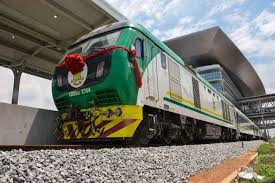China Harbour Engineering Co. has agreed to build a 68-kilometer railway in Lagos, Nigeria‘s bustling commercial center known for its severe traffic congestion. The project aims to alleviate the city‘s transportation woes and boost economic growth.

The railway, dubbed the Green Line, will connect Marina in Lagos’s central business district to the Lekki Free Zone, where major infrastructure projects like the Lagos Deep Sea Port and the Dangote Refinery are located. The line is expected to carry over 500,000 passengers daily at launch, with projections of exceeding one million as demand grows.
The agreement was formalized during the Forum on China-Africa Cooperation (FOCAC) held in Beijing this week. Chinese President Xi Jinping announced a series of economic incentives for Africa, including $50 billion in financial assistance and an additional $10 billion in investments from Chinese enterprises.
The funding for the Green Line project will be jointly secured by Nigeria‘s Ministry of Finance Inc., a state-owned investment firm, and China Harbour Engineering Co., which will be responsible for the design, financing, operation, and maintenance of the railway.
Lagos, with a population exceeding 20 million and an area comparable to the U.S. state of Rhode Island, is among the fastest-growing urban areas in Africa. However, the city’s inadequate road and transportation systems have forced residents to endure lengthy traffic delays, with commuters estimated to spend a staggering total of 14.1 million hours in traffic daily throughout the year, according to a 2021 report by the Lagos-based Danne Institute for Research.
The Green Line project is part of Lagos‘s Strategic Transport Master Plan, which aims to build a robust metro rail system featuring six Light Rail Transit (LRT) lines. The existing Blue Line, which runs from Mile 2 to Marina, and the Red Line, connecting Agbado in Ogun State to Oyingbo in Lagos, are already operational.
Once fully functional, the Green Line will complement these existing metro lines, offering modern, sustainable, and efficient transit solutions across Lagos. The project is expected to revolutionize public transportation in Lagos, reducing travel times and increasing economic productivity.




